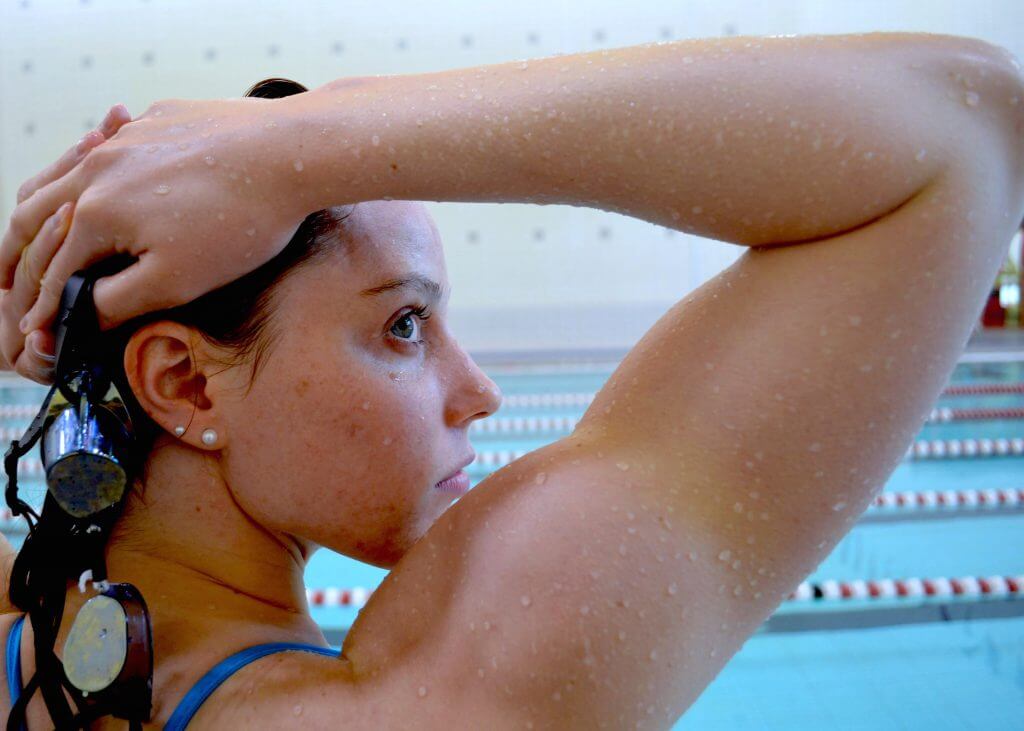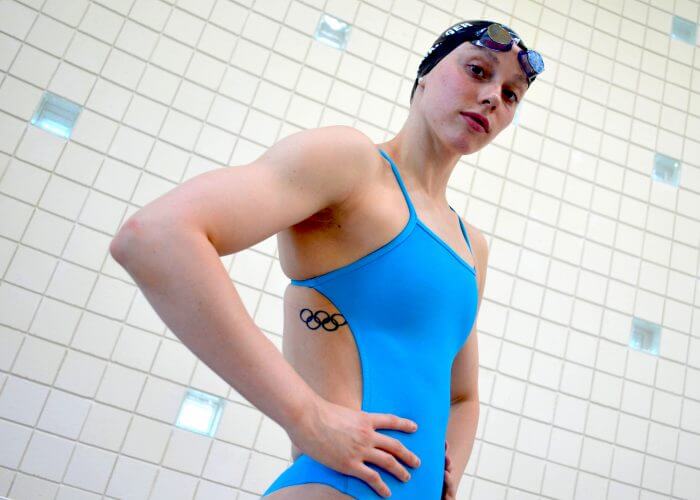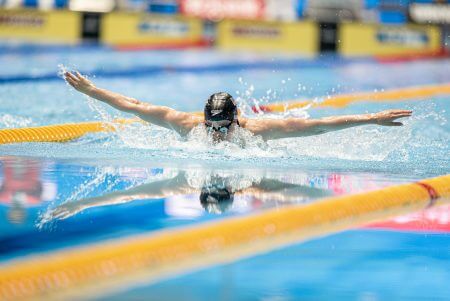Hali Flickinger Reflects on Move to Arizona State: ‘Finally Had the Guts to do it’

The postponement of the 2020 Olympics has created a year of transition and uncertainty for many swimmers. For Hali Flickinger, it is nothing new. She has been in the middle of a transition year anyway.
After spending the past seven years training at Georgia, Flickinger moved to Arizona State to train with Bob Bowman‘s post-grad group as she aimed for Tokyo.
It was a move that was a surprise to the swimming community, but one that Flickinger needed to make to rekindle her love of the sport.
“I am in a different situation where I switched teams this year. There is a lot of newness going on for me anyway, so I am just trusting Bob,” Hali Flickinger told Swimming World. “I have not been focused on trials or the Olympics this whole year. I have been able to have a little distraction that has helped me. That helps me not freak out about trials and the Olympics.”
Flickinger made the Olympic team in 2016, finishing seventh in the 200 fly in Rio. She has been one of the world’s most consistent performers in that event for the past five years. She won silver a the 2019 world championships, in a finish that was disappointing to her after having the top time in prelims, even faster than she was in finals.
Flickinger transformed her body into a dominating force, and has worked to transform her mental game as well. That is part of the reason she moved to Arizona.
“It has been a long time thinking about it,” she said. “I didn’t have the guts to do it. I have needed a change environment wise. I knew I wanted to swim outside and be somewhere a little different. I swam at Georgia for over seven years. I knew if I didn’t make the move this year, then I don’t think I could have been my best, because of the mental aspect of it. I believed that I needed a change just to be happy. Not to say I was unhappy at Georgia because I love Georgia so much. There was just something different I craved.”
So Flickinger moved to a warm place with an outdoor pool and another legendary coach, despite putting up some of the top times of her career. But fast times don’t equal happiness, something that took some reflecting to figure out.
“I can take a big sigh of relief. I was so scared. The first thing you think of is, ‘What are people going to say?’ I was swimming so well I was scared what people would think. It wasn’t all about my times. I didn’t think people would understand. You can be swimming great times and be miserable — or at least not be as happy as you think you should be in a great place. I am hoping the little courage I had to do this will help someone else not feel stuck,” Flickinger said.
Breaking the news to coach Jack Bauerle was the worst part, Flickinger said. How do you approach a coach that has given so much? Will they understand the “It’s not you, it’s me?” speech.
“I was so blessed and lucky to go to Georgia and be coached by Jack and have the teammates I had. That is why the decision was so hard. Jack married Martin (Grodzki) and I. He was like my second dad. To leave that was horrible. Even the thought of having to tell him I was thinking about it was hard. That killed me inside. I didn’t understand why I felt stuck or not as happy as I would have liked to be.”

Hali Flickinger; Photo Courtesy: Dan D’Addona
Fresh scenery has helped.
“I want to keep swimming and have a bright future still in the sport because I am happy and I am fortunate to be where I am,” she said.
Flickinger decided to give it a test run before completely uprooting.
“I came out in August and tried it out. I was here for three weeks. I knew after a week this was where I wanted to be. Martin flew out and we bought a house. He stayed in Georgia until Christmas and my mom came out and moved with me,” Hali Flickinger said. “It was great with my mom. She worked remotely and was on east coast time. She got up at 4 a.m. and worked and then helped me with things around the house. It was nice to have something familiar in a place where I knew nothing. It shows how much support I have had during my swimming career. I am really grateful for them.”
Now, it was finally all about adjusting to the swimming. And Bowman, who coached the great Michael Phelps to 23 Olympic gold medals, has helped ease that transition.

Hali Flickinger. Photo Courtesy: Becca Wyant
“It has been a lot different,” she said. “I know I made the right choice. Bob knows exactly what I need to do. These practices are made to make me the best I can possibly be. It has been a good change,” she said. “A lot of the sets I am doing, I have not done before, so that takes out a lot of comparison issues I have had. There is nothing to compare to.”
Flickinger can focus on the little things, the details that add up to make a big difference.
“It is a little bit of everything. Bob has changed my stroke, the little things that need to be fixed. He is on that about my stroke. That is something I have never really had before. The breathing pattern and finishes and turns. The little details of it. A lot of it is anaerobic as well. Going all out is really hard. I do more of that, but also a lot of distance. It is kind of a little bit of everything, which I like.”
And when discussing the training and tweaks that need to be made, Flickinger has found Bowman to be straight to the point.
“I appreciate the way Bob doesn’t sugar-coat things. My finishes are horrible. He is the first one to tell me. Now I am always thinking about that, so I am thinking about my finishes more because Bob is always on me about it,” she said. “I am very aware of my stroke now, not just going and going. I think that is really going to be huge for me, knowing that I did the work to fix these things.”
Now, Flickinger has even more time to fix these things since the 2020 Tokyo Olympics were postponed to 2021 because of the coronavirus pandemic.
“It is heartbreaking, but we are all in this together. I know my heart breaks for the NCAA swimmers, especially the seniors. We are trying to find things we can do at home. I do a lot of dry land stuff, so not having the actual equipment is a bit of a challenge. There are ways to get cardio in and ab workouts without compromising injury. We are all trying different things.”
Trying different things could mean trying different events at the Olympic trials. In addition to the butterfly events, she has qualified in both IMs, both backstrokes, the 200 free, 400 free and 800 free — and with the added time, will likely add the 100 free to that list.
So since she has been one of the fastest 200 flyers in the world, that is pretty set in stone, but she has plenty of options beyond that.
“Obviously the fly, but other than that, we haven’t really talked about a lineup,” she said. “It means a lot to me to have that much versatility. It means that I really put myself through some pain to train. The 100 back and 800 free are very different. I have worked hard.”
Hali Flickinger has worked hard in all aspects of the sport. She transformed her 5-foot-5 frame into a muscular force, stepped up her mental game to match, and now has the happiness and fresh look at the details to lead her into the peak stretch of her career as she aims for Olympic gold.




Melissa Murray
“You can be swimming great times and be absolutely miserable”. Sounds like she may have got some good advice from MP to come to Tempe!
Sunshine Smith. This
It was a
Great Move it?
Jon, her delts are bigger than mine!
VERY much looking forward to seeing Hali compete for the Olympic team next summer! Best of luck in preparation!
Change can be good!